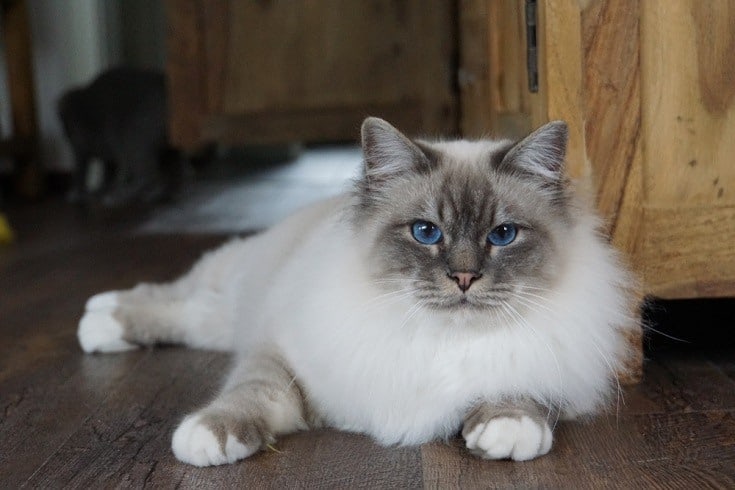| Height: | 8-10 inches |
| Weight: | 6-12 pounds |
| Lifespan: | 12-16 years |
| Colors: | Pale cream bodies with points in seal, chocolate, lilac, lynx, and parti-color; they will always have white “gloves” on their paws and bright blue eyes |
| Suitable for: | Families looking for an affectionate and even-natured cat |
| Temperament: | Friendly, not overly vocal, loves attention |
If you love the pointed coat of the Siamese but would prefer a longer-haired and less vocal cat, the Birman is going to be perfect for you. These medium to large cats are playful, friendly, and curious. They adore spending time with their families, but they’re not overly demanding if you happen to be doing something that doesn’t involve giving them all your attention.
Birman cats are striking with their blue eyes and longhaired coats that come in a variety of pointed shades. They also have four white feet, which just adds to their adorable appearance. Birman cats were once kept in temples, so it might be no surprise that these eye-catching cats evoke a sense of devotion from their owners.
They’re friendly and outgoing with their families and any visitors. The laidback attitude of the Birman makes them a great choice for first-time cat owners looking for a low-maintenance and gentle breed. Many devoted cat lovers also adore Birmans, and they’re one of the most popular purebred cats in the U.S.A.
Let’s take a look at all the character traits that make these cats so irresistible.
Birman Kittens — Before You Welcome One To Your Family …
Birman kittens are incredibly cute. But even though they’re a relatively low-maintenance breed in terms of the amount of time that they demand from you, you still need to think carefully before you decide to reserve that tiny kitten.
Birmans can suffer from a range of health conditions. While their life expectancy is decent at between 12 to 16 years, you may find that your cat needs veterinary treatment over and above what you would usually expect. So, besides regular vaccinations, annual check-ups, and so on, you may need to budget for additional treatments.
What’s the Price of Birman Kittens?
As one of the most popular purebred cats in the U.S.A, Birman kittens aren’t cheap. You should expect to pay anywhere from $800-$1,500 for one of these kittens.
You may indeed see Birman kittens advertised for less, but we suggest extreme caution before thinking that you’re getting a bargain. Breeding healthy kittens takes time and money, not to mention the knowledge and dedication required to know which health tests that each parent cat and the kittens will need. Cheaper kittens may not have been bred ethically, so they will potentially have more health conditions that will need expensive medical treatments as they mature.
Any reputable breeder of Birmans will be able to answer any questions that you may have about their breeding methods.
- The facilities that parent cats and their kittens are kept in
- Any health checks carried out, including the results
- Pedigree of the kittens
- If you can visit the breeder to meet the kittens and their parents
If a breeder can’t answer your questions nor provide any evidence of each kitten’s pedigree, you may find that they’re not experienced enough to be producing Birman kittens that are healthy and will lead happy lives for years to come. It’s better to take your time and seek assurance that a breeder can answer all your questions than to rush into buying a kitten from someone who may not be as experienced or qualified as you might have hoped.
All Birman kittens are born white due to the fact that they possess the Himalayan gene. It’s this gene that’s responsible for their striking pointed coats. As the kittens mature, the color of their points will become more obvious until their final coloration can be seen, usually by the time they’re 12 weeks old.
 3 Little-Known Facts About Birman Cats
3 Little-Known Facts About Birman Cats
1. Birmans are also known as the Sacred Cats of Burma
Birmans are an ancient breed, so of course, they have a legend attached as to how they came to be! It’s told that snow-white cats lived in the temples of Burma, now known as Myanmar. These cats were worshipped as the feline reincarnations of previous temple priests.
One day, a priest known as Mum-Ha was attacked by violent marauders who had come from Siam to raid the temple. As Mun-Ha lay dying, his faithful cat, Sinh, put his paws on Mun-Ha’s head. At this point, Sinh’s white fur darkened across his face, legs, tail, and ears, and his eyes changed color from yellow to striking bright blue. His paws stayed snow-white, as a sign that Mun-Ha’s spirit was pure.
The following day, it was discovered that all the temple cats had also undergone the same color change. Seven days after the transformation, Sinh also died and carried Mun-Ha’s spirit to paradise.
2. The history of the breed is a little unclear
While the story of how the temple cats changed their color is romantic, the actual history of the breed isn’t clear. Some reports suggest that the breed arrived in France in 1919, and there are two different accounts of how that happened, neither of which can be verified.
One version says that two Westerners aided the priests at Burmese temples when the temples were raided. It’s thought that Major Gordon Russell and Auguste Pavie helped some of the priests escape, and they were gifted two Birman cats as a show of appreciation.
Another version suggests that someone called Mr. Vanderbilt bought a pair of Birman cats from a temple servant. Whichever version is correct, both accounts name the pair of cats Maldapour and Sita. The male cat, Maldapour, died on the boat crossing to France, but the female, Sita, was already pregnant with his kittens. She is thought to be the foundation of the Birman breed in Europe.
The breed became popular in France and was accepted by the breed registry there in 1925. Their original name there was the “Sacre de Birmanie,” which is where their modern name, the Birman, originates from.
3. The Birman breed was nearly wiped out during World War II
Birman cats were almost wiped out completely during the Second World War. It’s thought that at one point, only two Birman cats remained. Over many years, the breed was slowly re-established, and it’s thought they were crossed with other breeds like the Siamese, Persian, and Turkish Angora to be saved. By 1955, the breed was once again stable and growing in popularity.
The first Birman cats came to the U.S. in 1959, and the breed was accepted into the Cat Fanciers Association in 1967. Their popularity hasn’t dwindled since, and they consistently rank as one of the most popular longhaired breeds in the country.

Temperament & Intelligence of the Birman
Birman cats are fairly laidback, and while you’ll definitely know that they’re in the house, they’re not demanding of your attention. They may quietly let you know that they’d like food, please, but they won’t march up to you and demand to be fed right this instant.
They’re adaptable and quite happy to live in a relatively busy household. In fact, they quite enjoy the opportunity to make friends with all the people passing through. This can make them a prime target for cat nappers, so many families decide to keep these valuable, eye-catching, and friendly cats indoors all or most of the time.
Birman cats are used to being worshipped, so don’t be surprised if your cat quickly becomes the center of your household! This breed loves human affection, so while they’re happy entertaining themselves while you’re out and about, they’ll always be extremely glad to see you come home.
Are These Cats Good for Families?
Birmans are an excellent choice as a family cat. They’re relaxed enough to be happy living in a busy household and will play nicely with kids as long as those children know how to interact with cats safely and respectfully. Birmans are quite happy to be picked up and cuddled. Some cats develop the adorable habit of going floppy in your arms, and many Birmans even enjoy being held like a baby. All the better for you to worship them!
Birmans are sociable but not overly demanding. They love human company, and they will often follow you around the house so they can be in the same room as you, but they’re not pushy with it. They’re happy being left alone for a few hours each day while members of the family are at work, and you can always be sure of an enthusiastic welcome when you get home!
Does This Breed Get Along With Other Pets?
The relaxed character of the Birman breed makes them a prime candidate for multi-pet households. Birmans are quite happy to live with both other cats and dogs as long as they’re introduced carefully.

 Things to Know When Owning a Birman
Things to Know When Owning a Birman
Deciding to bring a stunning Birman cat into your home shouldn’t be a decision that you rush into. Before you make up your mind, here’s more information to help.
Food & Diet Requirements 
Each and every cat is an individual, so your Birman will have their own preferences when it comes to its meals. Some prefer a wet food, others enjoy kibble, and some may prefer a raw food diet. The most important thing is to make sure that whatever food you choose has a high percentage of protein, preferably from real meat rather than meat by-products.
It’s also important to bear in mind the age of your cat and to choose a feed that’s designed to meet its specific nutritional needs. Kittens require certain nutrients, like DHA and AHA, that mature cats don’t need, while seniors will benefit from foods enriched with glucosamine and other supplements designed to help ease joint pain.
Exercise
Birman cats aren’t overly active, but they do enjoy regular play sessions interspersed with naps! Birmans can be persuaded to play with a little encouragement, especially if you have a selection of different toys to tempt them with.
Many owners opt to keep their Birman as an indoor cat, in which case, they can enjoy going for walks on a harness and leash. Indoor cats will love it if their owners install an outdoor cat enclosure, so they can enjoy the fresh air, sights, and sounds of the outdoors without being exposed to predators or strangers. As expensive and outgoing cats, Birmans can be targeted as an easy breed to steal for anyone wanting to obtain an expensive purebred cat without having to buy it themselves.
Whether your cat goes outside or not, they’ll benefit from a range of enrichment within the home. You can add scratching posts, shelves designed for sleeping, cat condos, birdwatching stations, and more.
Training
Birmans are laidback, but that doesn’t mean they’re not smart. They love getting involved in whatever their humans are doing, and training sessions can be a great way to spend time together, as well as a good bonding exercise.
You can train your Birman to walk on a harness and leash pretty easily, but be sure they’re comfortable and confident on the leash before venturing outside. Birmans will usually be happy going wherever their owners go, so training them to come on road trips or popping them into a cat backpack and taking them for a hike can be fun. Just make sure to regularly check that your cat enjoys these kinds of activities, as one Birman cat may be happy to head away for a weekend road trip with their owners, and another cat may prefer to stay at home with a house sitter.

Grooming ✂️
Birmans have a medium-length coat with a soft and silky texture. It’s not prone to matting or tangles, but you will need to brush your cat’s coat at least biweekly to help remove shedding hair.
As with any cat breed, Birmans can suffer from periodontal disease.
- Brush your cat’s teeth weekly.
- Use dental treats to help clean teeth and freshen breath.
- Consider adding an additive to your cat’s water.
- Schedule regular dental check-ups with your cat’s veterinarian.
Health and Conditions
Most purebred cats have genetic health conditions, and the Birman is no exception. We’ve outlined the most common ones below, but make sure to ask any breeder for details about the health tests that they carry out on parent cats and their kittens.
- Shaking and trembling affecting very young kittens
- Kidney dysfunction
- Congenital hypotrichosis
- Thymic aplasia
- Corneal dermoid
- Spongiform degeneration
 Male vs. Female
Male vs. Female
You might be wondering whether a male or female cat would be best for you and your family. We highly recommend waiting to meet the litter of kittens that you’re interested in and spending time getting to know them before making your decision.
Each kitten will have individual personality traits that aren’t necessarily dependent on their sex. Perhaps you’ve had an outgoing and affectionate female cat previously, and you are disappointed to find out that all the females in the litter seem to be shyer than the males.
In brief, female cats are usually more independent and don’t often spray to mark their territory (although they might), and if they’ve been spayed, they will likely stay close to their homes. On the downside, they can be noisy and prone to fighting if they live in a household with another female cat.
Male cats are often more affectionate than females and will tend to be a little more relaxed. Typically, male cats will be larger too. If you leave your male cat unneutered, he may be aggressive to other male cats in the household or try to wander off in search of females. He’ll likely spray around the house, even if his litterbox is spotless!
Many veterinarians recommend that male and female cats that won’t be used for breeding should be neutered or spayed. This can reduce the likelihood of them spraying or wandering far from home, as well as remove the possibility of accidental litters of kittens!
 Final Thoughts
Final Thoughts
The Birman is an ancient breed whose history is steeped in wonder. The story of them being honored as temple cats is an homage to this affectionate, gentle, and relaxed breed. Birmans provide that perfect combination of affection and independence. While they’re happy to spend hours with their owners, they’re not loud or demanding. Most of them will simply wait until you’re ready to give them attention.
Their relaxed attitude to life makes them a great choice for busy houses full of kids and other pets. You’ll need to set aside time each week to groom your cat’s longhaired coat, but they’re fairly low-maintenance in relation to some other longhaired cats that require much more grooming.
Birmans can suffer from more health conditions than the average cat, and while these don’t always impact their life expectancy, you might need to be prepared to commit to regular vet bills. Many families are happy to share their homes with one of these magical cats.
Related read:
- Domestic Longhair Cat vs Maine Coon Cat: What’s the Difference? (With Pictures)
- Birman vs Siamese Cat: Main Differences (With Pictures)
Featured Image Credit: Jeannette1980, Pixabay








